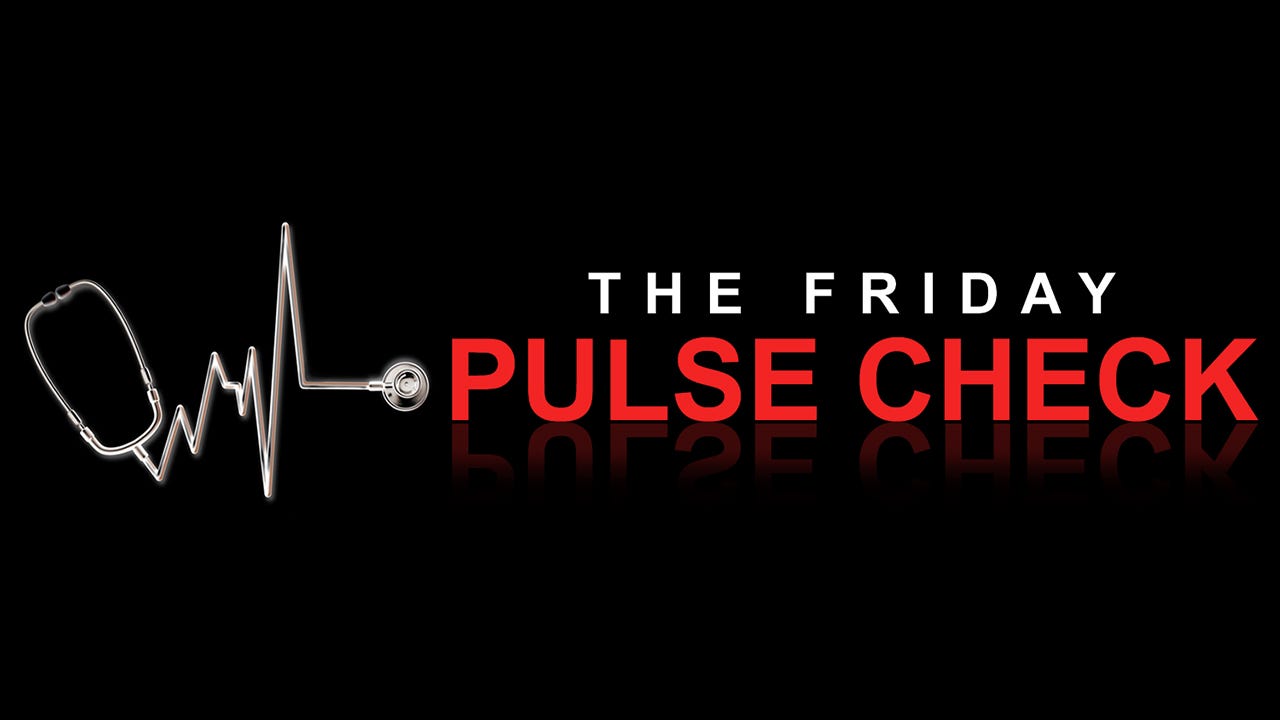Get your Bright Health claims in now!
The Friday Pulse Check
Good morning and happy Friday. Another week has gone by and we are going to take a look at the most important headlines facing providers and patients.
In the news:
Bright Health going under
Fulcrum Strategies confirmed earlier this week that Bright Health Group is pulling all of its plans, including Exchange plans, from most of the states they operate in except for Florida and California. The retreat comes just weeks before open enrollment begins for Medicare Advantage and Obamacare plans. Bright Health has been struggling for a while now. You can see their current stock price here: BHG 0.00%↑. It peaked at $16.70 a share soon after the company went public.
To our physician and healthcare administrative managers: get your claims in now! When the money to pay your claims is gone, it’s gone. Read more from Forbes.
Monkeypox cases continue to decline
There are several factors leading to its decline. Firstly, the vaccine for monkeypox, since it has already been developed, was quickly deployed to the most affected areas. Secondly, experts say that cases spread more rapidly in June which is Pride Month for the LGBT+ population. Because those events have ended, fewer hookups have occurred. Read more in the New York Times.
Private equity money hurting independent physicians
Bright Health’s announcement will hurt their patients. Come January, those Bright Health id cards will be useless in most places. As we have discussed both here and on the FLATLINING Podcast, private equity money does create a conflict of interest problem in our healthcare system. Are physicians going to be able to make their own decisions or will their bosses restrict patient care to save money?
One palatable advantage to private equity money is the injection of capital into some struggling practices and hospitals. But what happens when a provider says “no?” Kaiser Health News reports about a physician in Sanford, North Carolina who is struggling to compete with the private equity-backed hospitals in his area. Read more from Kaiser Health News.
The COVID-19 conspiracy rabbit hole
Ron and I once again ventured into some of the weird corners of the internet this week on the FLATLINING Podcast. Last week on the Friday Pulse Check, I reported about HHS’ purchase of a stockpile of the acute radiation syndrome drug Nplate. After the newsletter was published, we received some comments questioning the timing of such a purchase and alluding to a conspiracy theory that said it was because of COVID-19 vaccines.
Ron and I looked into this conspiracy. There is some evidence that the COVID-19 vaccines cause a rare thyroid problem in younger people. Nplate can be used to treat some thyroid illnesses, including the one caused by the COVID-19 vaccines.
The study, however, states that this rare thyroid problem only occurred with the Astra-Zeneca and Johnson&Johnson vaccines; Astra-Zeneca’s COVID-19 vaccine was never approved in the United States. In the US, over 200 million people have been vaccinated. How many people have been diagnosed with the thyroid problem? Twelve. Only twelve people had a vaccine induced thyroid problem that is easily treatable with other drugs. Thus, the Nplate purchase was not for COVID-19 vaccines.
The comment and underlying conspiracy demonstrate that the messaging for the vaccines failed and continues to fail. Nearly two years after these vaccines have been available to the public, there are still people who believe they are unsafe, ineffective, and part of a greater plot.
Our recommendation has stayed the same: talk to your doctor. If you have questions or concerns about the COVID-19 vaccine or any vaccine, drug, or procedure talk to your doctor. He or she looks at the data. They are trained to look at the data to make an appropriate recommendation for you and have your best interests.
The person reading headlines and abstracts from very detailed NIH and other medical studies do not. Their purpose is selfish. It comes from a need to constantly be right about everything and will twist any grain of truth to fit their narrative so they can be right. I have some disappointing news for them: they will never get a pat on the back and they will never say I told you so.
Subscribe to the FLATLINING Podcast on Apple Podcasts, Spotify, the iHeartRadio app, Amazon Music, Google Podcasts, and Audible.
Ukraine
Last week, I posed the possibility that the Nplate purchase is intended as aid to Ukraine and Europe in the event there is a nuclear attack from Russia or an accident/disaster at the nuclear power plant in Ukraine.
I appear to have been affirmed in that belief as Finland seems to have run short of iodine tablets, another drug used in nuclear emergencies. The Nordic country’s health department recommended that households buy a single dose in the event of an emergency. Pharmacies are reporting shortages and wholesalers also say they are out of stock. Read more from the PBS Newshour.
Final thought
The Federal Reserve Bank of Dallas said this week that healthcare inflation will double between mid-2022 and mid-2023. This will land the ticking time bomb of rising healthcare costs right in President Joe Biden’s lap as candidates attempt to take on the president in 2024.
Since Biden has not announced whether he will run, there is a possibility that it will be a major issue for the Democrats with any candidate they try to put in his place. Healthcare costs continue to be one of the top issues for voters across the country and when independents see that the Inflation Reduction Act did virtually nothing to combat those costs (or actually negotiate Medicare drug prices) they may turn and opt for a Republican alternative.
This all assumes, perhaps generously, that Republicans will have a real healthcare policy agenda in 2024. As I said back in March, COVID-19 grousing is not a winnable policy against “I’ll give you free healthcare” (ahem, Senator Bernie Sanders). Democrats could fail to do anything to reform healthcare, see the inflation rate double, and still win if Republicans don’t get their acts together.
If the Republicans manage to take one or both chambers in this year’s midterm, it could even benefit the Democrats’ presidential chances in 2024. They could then legitimately claim that Republicans tried to block their efforts and thus couldn’t pass meaningful legislation. That scenario, of course, relies on voters not remembering that the Inflation Reduction Act did nothing for healthcare.
The midterms are just weeks away now. We guarantee that we will be following them and any healthcare developments here on the Friday Pulse Check and the FLATLINING Podcast.
Have good weekend,
Matthew




